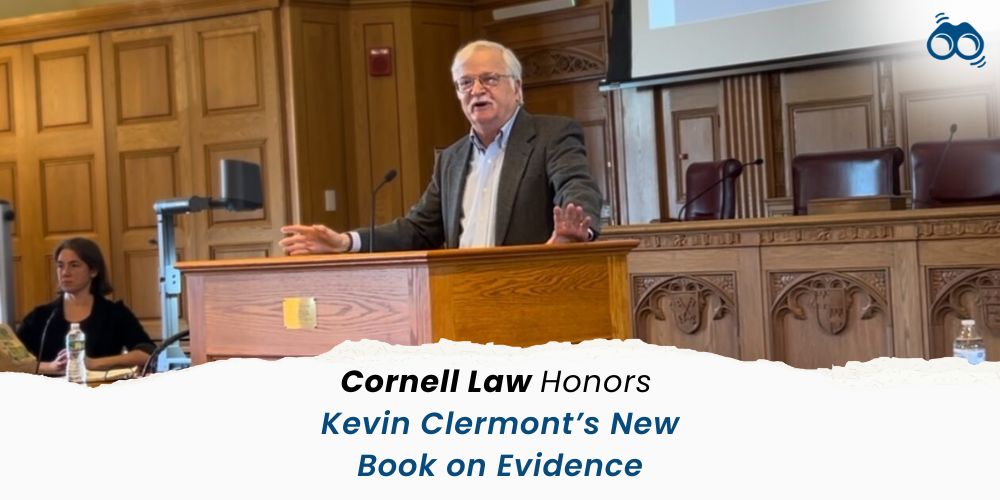Legal Experts Weigh in on Clermont's Book, A General Theory of Evidence and Proof
Cornell Law Hosts Discussion on Clermont’s Groundbreaking Theory of Evidence and Proof
Cornell Law School hosted a celebration for the release of Kevin Clermont's new book, A General Theory of Evidence and Proof: Forming Beliefs in Truth. The event, held in the MacDonald Moot Court Room, included remarks from Clermont, Robert D. Ziff Professor of Law, along with Cornell Law colleagues Michael Dorf, Robert S. Stevens Professor of Law, and George Hay, Charles Frank Reavis Sr. Professor of Law.
As one of the leading experts on civil procedure in the United States, Clermont’s new book marks his second publication in two years. Earlier, he had also celebrated the launch of Come on, Children: The Autobiography of George Washington Fields, a book he edited, which was released in February. The book addresses debate on how truth should be pursued, questioning whether to proceed by belief or probability. He traces probability’s origins to Pascal and Fermat, noting its shift from education to law. While recognizing legal contributions to probability, Clermont highlights courts' struggle with "inner convictions of truth." He concludes that the law has developed an effective model of non-additive, multivalent beliefs suited to its methods.
George Hay pointed out that the book makes two contrasting claims: first, that some law scholars misuse probability, and second, that judges and juries generally get it right, with the confusion lying more with academics. Michael Dorf shared that Clermont's work helped him see things differently, stating that the book made him realize that the law’s approach actually makes sense and is just, with the problem being rooted in probability's product rule.
Clermont’s key takeaway is that the intuitive approach to evidential proof, predating Pascal, still holds value. He emphasized that the standard of proof applies consistently to individual elements or the entire case and that inferences can be built without the product rule. He advocated for trusting belief functions in fact-finding, law, and science. The book offers a fresh perspective on the intersection of law and probability, challenging traditional assumptions while reinforcing the law’s practical wisdom. His work encourages a deeper understanding of how belief functions shape legal reasoning and truth-finding.
Editor's Note:
Cornell Law School recently celebrated the release of Kevin Clermont's thought-provoking book, A General Theory of Evidence and Proof: Forming Beliefs in Truth. In this work, Clermont challenges traditional approaches to evidential proof, questioning the use of probability in law and advocating for a more intuitive, belief-based framework. His insights have sparked meaningful discussion among legal scholars and practitioners, highlighting the relevance of non-additive beliefs in the pursuit of truth.
Skoobuzz appreciates Clermont’s innovative approach to reshaping legal thought and its potential to influence future debates on evidence and proof.














0 Comments (Please Login To Continue)